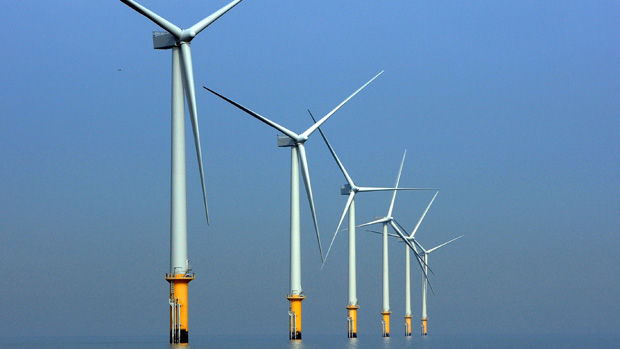Offshore wind firms pledge billions of new investment
Onshore wind and solar power are struggling after removal of government support

A free daily email with the biggest news stories of the day – and the best features from TheWeek.com
You are now subscribed
Your newsletter sign-up was successful
Two companies involved in building offshore wind power in the UK have pledged to continue to invest billions of pounds in the coming years, as subsidy cuts undermine the case for rival renewable energies.
Dong Energy, the biggest operator of offshore wind farms in the UK, told The Guardian it would double the £6bn it had invested adding new capacity in recent years by 2020. Another company, Sweden-headquartered Vatenfall, said it too was "optimistic" about 2016 and will be proceeding with a testing site for its latest farm off the coast of Aberdeen this summer.
Brent Cheshire, Dong's UK division chairman, said he "had harboured concerns about government policies as little as two months ago", but that a recent speech by energy secretary Amber Rudd, during which she pledged support for offshore wind power as long as costs were kept down, had given him confidence.
The Week
Escape your echo chamber. Get the facts behind the news, plus analysis from multiple perspectives.

Sign up for The Week's Free Newsletters
From our morning news briefing to a weekly Good News Newsletter, get the best of The Week delivered directly to your inbox.
From our morning news briefing to a weekly Good News Newsletter, get the best of The Week delivered directly to your inbox.
Rudd's comments should mean current subsidies are secure, which Cheshire said was crucial as hopes offshore wind will be subsidy-free by 2023 are "over-optimistic".
The government has been coming in for fierce criticism over cuts to subsidies for a whole range of renewable power options, which have come even as the UK has signed up to an international deal to help prevent catastrophic climate change that is exacerbated by carbon-intensive traditional power generation.
In particular the government was criticised for cutting the subsidies on small-scale solar power generation, which was said to be behind the collapse of two firms and the loss of around 1,000 jobs. It has also cut support for onshore wind and put approval for new projects in the hands of often-recalcitrant local communities, despite this becoming the cheapest way to produce electricity in the UK.
A free daily email with the biggest news stories of the day – and the best features from TheWeek.com
-
 6 exquisite homes with vast acreage
6 exquisite homes with vast acreageFeature Featuring an off-the-grid contemporary home in New Mexico and lakefront farmhouse in Massachusetts
-
 Film reviews: ‘Wuthering Heights,’ ‘Good Luck, Have Fun, Don’t Die,’ and ‘Sirat’
Film reviews: ‘Wuthering Heights,’ ‘Good Luck, Have Fun, Don’t Die,’ and ‘Sirat’Feature An inconvenient love torments a would-be couple, a gonzo time traveler seeks to save humanity from AI, and a father’s desperate search goes deeply sideways
-
 Political cartoons for February 16
Political cartoons for February 16Cartoons Monday’s political cartoons include President's Day, a valentine from the Epstein files, and more
-
 Labour shortages: the ‘most urgent problem’ facing the UK economy right now
Labour shortages: the ‘most urgent problem’ facing the UK economy right nowSpeed Read Britain is currently in the grip of an ‘employment crisis’
-
 Will the energy war hurt Europe more than Russia?
Will the energy war hurt Europe more than Russia?Speed Read European Commission proposes a total ban on Russian oil
-
 Will Elon Musk manage to take over Twitter?
Will Elon Musk manage to take over Twitter?Speed Read The world’s richest man has launched a hostile takeover bid worth $43bn
-
 Shoppers urged not to buy into dodgy Black Friday deals
Shoppers urged not to buy into dodgy Black Friday dealsSpeed Read Consumer watchdog says better prices can be had on most of the so-called bargain offers
-
 Ryanair: readying for departure from London
Ryanair: readying for departure from LondonSpeed Read Plans to delist Ryanair from the London Stock Exchange could spell ‘another blow’ to the ‘dwindling’ London market
-
 Out of fashion: Asos ‘curse’ has struck again
Out of fashion: Asos ‘curse’ has struck againSpeed Read Share price tumbles following the departure of CEO Nick Beighton
-
 Universal Music’s blockbuster listing: don’t stop me now…
Universal Music’s blockbuster listing: don’t stop me now…Speed Read Investors are betting heavily that the ‘boom in music streaming’, which has transformed Universal’s fortunes, ‘still has a long way to go’
-
 EasyJet/Wizz: battle for air supremacy
EasyJet/Wizz: battle for air supremacySpeed Read ‘Wizz’s cheeky takeover bid will have come as a blow to the corporate ego’